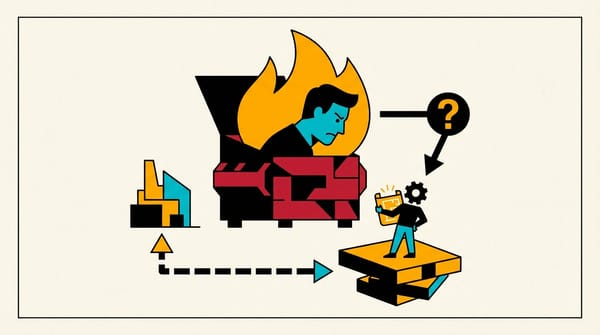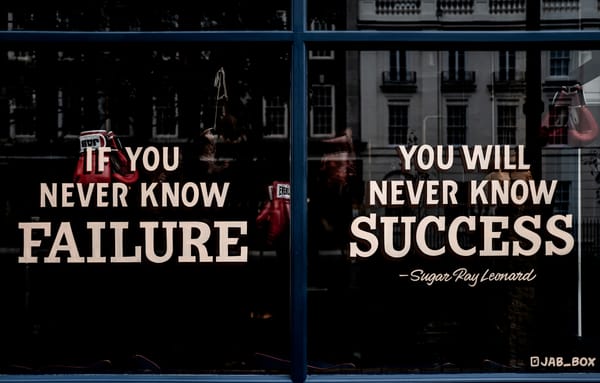Unlocking Potential: The Deconstruction of Thought as a Key to Personal Growth and a Successful Career
Descubre cómo deconstruir tus pensamientos puede desbloquear tu potencial y llevarte al crecimiento personal y éxito profesional. ¡Empieza hoy!

Hello, dear ones!
Today I want to propose a simple idea that, despite requiring some effort, will bring disproportionately large results. All that is required of you is to be open to new things and adjust your thinking to flexibility. Let's give it a try!
How do we become better? We read smart books and acquire new knowledge, which leads to gradual personal growth.
But, have you ever wondered that unlike acquiring new knowledge, sometimes getting rid of excess can significantly increase your efficiency?
When I started working at "Red Square," I was flooded with a stream of urgent and diverse tasks. The projects demanded not only creative solutions but also reevaluating everything familiar to me. When I reached my productivity peak with daily overtime, I stopped to understand the situation and realized that my main obstacle was not external circumstances, but my own beliefs and constructs.
From childhood, I was taught that success is the result of hard work, perseverance, and constant education. But at that moment, I realized that this mentality would lead me to burnout. And I decided to take another path: instead of increasing the number of working hours, I began to look for ways to simplify tasks and learned to say "no" professionally.
I propose calling this process "thought deconstruction." I deconstructed my mindset, and now it sounds like this: success is the result of constant work, perseverance, constant education, and thought deconstruction.
This experience taught me an important lesson: deconstructing established beliefs and being willing to see things from another angle can lead to unexpected and successful results. It showed me that sometimes we need to let go of old perceptions to discover new opportunities.
Imagine your beliefs as a garden, where each belief is a plant. Some plants are nutritious and support your health and growth, while others are weeds that repress the useful plants. Thought deconstruction is like gardening, where you regularly remove weeds (unproductive beliefs) and plant new and useful ones so that your garden (mind) is healthy and prosperous.
By applying deconstruction to our personality, we break down the whole into parts and reinterpret it.
We review our knowledge, which may already be outdated or refuted.
We destroy stereotypes and prejudices, review our beliefs, and abandon those that hinder us from living; some of them are not even ours, they were simply instilled in us from childhood, through hierarchy, domination, and other social constructs. That's why I would like you to think:
When was the last time you stopped to reconsider what you consider an absolute truth?
Research
- Flexibility of thought and creativity: A study published in the journal "Psychological Science" in 2011 showed that temporary permanence in a state of uncertainty can significantly improve the ability for abstract thinking and creativity. Scientists found that when participants faced uncertainty, they were more likely to generate innovative ideas.
- Deconstruction of beliefs and decision making: An article published in the "Journal of Personality and Social Psychology" in 2012 demonstrated that people who can critically analyze their beliefs and assumptions show greater efficiency in decision-making and problem-solving. This underscores the importance of thought deconstruction to improve cognitive functions.
- Learning and flexibility of thought: A study conducted at Stanford University showed that an approach based on thought flexibility and openness to new experiences significantly improves the ability to learn and adapt to new tasks. Scientists discovered that students who were taught flexible thinking techniques showed better results in learning and problem-solving than those who adhered to traditional teaching methods.
- Flexibility of thought and career success: A study conducted by Harvard Business Review showed that one of the key qualities that define successful leaders is thought flexibility. The analysis of more than 100 high-level leaders showed that the ability to adapt to changes and review their beliefs in light of new information has a significant impact on leadership effectiveness and achieving organizational goals.
These studies confirm that thought deconstruction and mental flexibility not only contribute to personal growth and creativity but are also key factors in successful decision-making, learning, and building a career.
Examples
Education: Memorization
Destructive attitude: "Learning is difficult and unpleasant. The only way to remember something is by memorizing it." Thought deconstruction: There is some truth in this, but the truth is not unequivocal. Memorization is good at short distances. We learn the material the night before the exam and conveniently forget everything afterward. But at long distances, you need spaced repetition and understanding of the material.
Work: Workaholism or overtime work
Destructive attitude: "To achieve everything, you just need to work more." Thought deconstruction: If you have an urgent task that you need to complete, say, in a day. You shouldn't skip lunch and breaks because this will significantly diminish your cognitive abilities in the second half of the day. The more intensely we work, the faster we get exhausted. If you don't take a break to rest in the middle of the day, our productivity starts to drop dramatically.
For example, the probability that anesthesiologists make mistakes in operations in the second half of the day increases fourfold.
Take small breaks for coffee, tea, or water, completely distracting yourself from work. And during lunch, distract yourself, this will help activate the default system, which will put everything in place. Have lunch in good company, this will produce oxytocin and calm your anxiety.
If the text stops here, subscribe to keep reading. It's free.
Work: Imposter syndrome
Destructive attitude: "I'm not good enough for this job, and soon everyone will know." Thought deconstruction: Reinterpreting this attitude involves recognizing that the feeling of incompetence is a common phenomenon and does not reflect your true professional potential. Working on self-confidence and recognizing your achievements helps to reinterpret this attitude. Applying deconstruction in this context includes actively seeking feedback, looking for mentorship, and recognizing your own successes, which allows you to see your own competencies from a new perspective.
Personal relationships: Fear of rejection
Destructive attitude: "If I express my true feelings or opinions, I will be rejected." Thought deconstruction: This attitude can be reinterpreted through understanding that the open expression of feelings and opinions deepens relationships and contributes to their development. Practicing empathy and active listening in relationships can help understand that your openness will not lead to rejection, but rather help establish a deeper connection. Exercises to strengthen self-esteem and develop communication skills can also contribute to the deconstruction of this attitude.
Personal development: Fear of failure
Destructive attitude: "It's better not to try than to try and fail." Thought deconstruction: Understanding that failure is an important part of learning and development can help reinterpret this attitude. Accepting risks and failures as opportunities for growth and learning allows overcoming fear and aspiring to new goals. Setting goals that include the possibility of failure as part of the learning process, and recognizing each step forward can help rebuild thinking in a more constructive direction.
Health and fitness: All or nothing
Destructive attitude: "If I can't exercise at the gym every day, then there's no point in starting." Thought deconstruction: Revising this attitude involves understanding that any amount of physical activity is better than none, and that regularity is more important than intensity. Setting realistic goals and recognizing the importance of flexibility in training plans helps overcome the "all or nothing" approach. Breaking large goals into small achievable steps also promotes a more sustainable approach to health and fitness.
Financial well-being: Fear of risk
Destructive attitude: "Investing is dangerous; it's better to keep money under the mattress." Thought deconstruction: Learning the fundamentals of investment and understanding that risk can be managed and minimized helps change this attitude. Mastering the basic principles of investment diversification and understanding the long-term perspective of investments can alleviate the fear of risk. Gradual introduction to the world of investments with the help of reliable sources and expert financial advice can help build confidence in your own financial decisions.
By the way, this is my personal fear that I need to dismantle, starting to gradually learn about investments for a secure old age.
These examples demonstrate how thought deconstruction can help reinterpret and transform destructive attitudes in various aspects of life, paving the way to a healthier and happier existence.
For those who want to act
To start the process of deconstructing beliefs and developing thought flexibility, it is important to integrate exercises and practices that encourage self-reflection and critical analysis into your routine. Here are some concrete steps and tips that can help in this process:
1. Self-reflection journal
Start keeping a journal where you record your thoughts, beliefs, and emotional reactions to different events. This will help you better understand what beliefs govern your reactions and why. Ask yourself questions like: "Why do I feel this way?" or "What belief is at the base of my reaction to this situation?"
2. "5 Whys" technique
Use the "5 Whys" technique for a deep analysis of your beliefs. Every time you encounter a problem or emotional reaction, ask yourself "why?" five times to get to the root cause. This can help identify and reconsider deeply ingrained beliefs.
4. Reading and education
Broaden your horizons by reading books and articles, watching documentaries, and participating in educational courses on topics beyond your usual circle of interest. This can help you see the world from a different angle and stimulate the reconsideration of your own beliefs.
5. Discussion with others
Engage in open and constructive discussions with people whose opinions differ from yours. Try to understand their perspective without trying to convince them. This can help you see the weaknesses in your own beliefs and consider alternative viewpoints.
6. Reconsideration games
Try games and exercises aimed at developing creativity and critical thinking, such as "Inverting the Assumption." Take one of your beliefs and challenge yourself to see the situation from the opposite assumption. This can help you see how your belief affects your perception of reality.
7. Role models and mentorship
Find a role model or mentor who demonstrates openness of thought and the ability to deconstruct their own beliefs. Discussing your self-reflection process with them and getting feedback can be extremely helpful.
By applying these practices regularly, you can develop thought flexibility, which will not only improve your ability to adapt to changes but also enrich your personal and professional life.
Conclusion
Deconstruction is necessary to rethink knowledge and free ourselves from beliefs and prejudices that don't work. This can be useful not only at work but also in personal life. You may have beliefs that artificially limit your possibilities.
In conclusion, the process of deconstructing beliefs is not just an exercise in self-analysis; it is a journey towards a more conscious, flexible, and happy life. Allow yourself to see habitual beliefs from a new perspective, dare to question "eternal truths," and be open to changes. This process may seem complicated or even scary, but the fruits are worth it. You will discover new horizons of your possibilities, improve the quality of your life, and find new ways to achieve your goals.
Start your deconstruction journey today. Take time for self-reflection, identify a belief you would like to rethink, and take the first steps. And remember that every small change in thinking can lead to big changes in life.
I invite you to share your stories and experiences of deconstructing beliefs in the comments or on social networks. Your stories can inspire others to start their own path of change and demonstrate that rethinking beliefs is not only possible but also extremely beneficial. Let's create a community that supports and inspires each other on the path to a better understanding of ourselves and the world around us.
Together we can transform not only our own lives but also contribute to changing society for the better. Start with yourself now and don't let obsolete beliefs stand in the way of your happiness and success. Let's move forward with changes!




